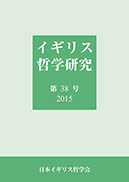38 巻
選択された号の論文の11件中1~11を表示しています
- |<
- <
- 1
- >
- >|
特別講演
-
2015 年 38 巻 p. 5-14
発行日: 2015/03/20
公開日: 2018/03/30
PDF形式でダウンロード (490K)
論文
-
2015 年 38 巻 p. 15-26
発行日: 2015/03/20
公開日: 2018/03/30
PDF形式でダウンロード (411K) -
2015 年 38 巻 p. 27-41
発行日: 2015/03/20
公開日: 2018/03/30
PDF形式でダウンロード (342K) -
2015 年 38 巻 p. 43-58
発行日: 2015/03/20
公開日: 2018/03/30
PDF形式でダウンロード (419K)
書評
-
2015 年 38 巻 p. 59-82
発行日: 2015/03/20
公開日: 2018/03/30
PDF形式でダウンロード (590K)
学界展望
-
2015 年 38 巻 p. 83-94
発行日: 2015/03/20
公開日: 2018/03/30
PDF形式でダウンロード (425K)
国際学会報告
-
2015 年 38 巻 p. 95-100
発行日: 2015/03/20
公開日: 2018/03/30
PDF形式でダウンロード (334K)
特別寄稿
-
2015 年 38 巻 p. 101-102
発行日: 2015/03/20
公開日: 2018/03/30
PDF形式でダウンロード (220K)
第38回大会報告
-
2015 年 38 巻 p. 103-116
発行日: 2015/03/20
公開日: 2018/03/30
PDF形式でダウンロード (458K)
部会研究例会報告
-
2015 年 38 巻 p. 117-127
発行日: 2015/03/20
公開日: 2018/03/30
PDF形式でダウンロード (405K)
編集後記
-
2015 年 38 巻 p. 131
発行日: 2015/03/20
公開日: 2018/03/30
PDF形式でダウンロード (248K)
- |<
- <
- 1
- >
- >|
